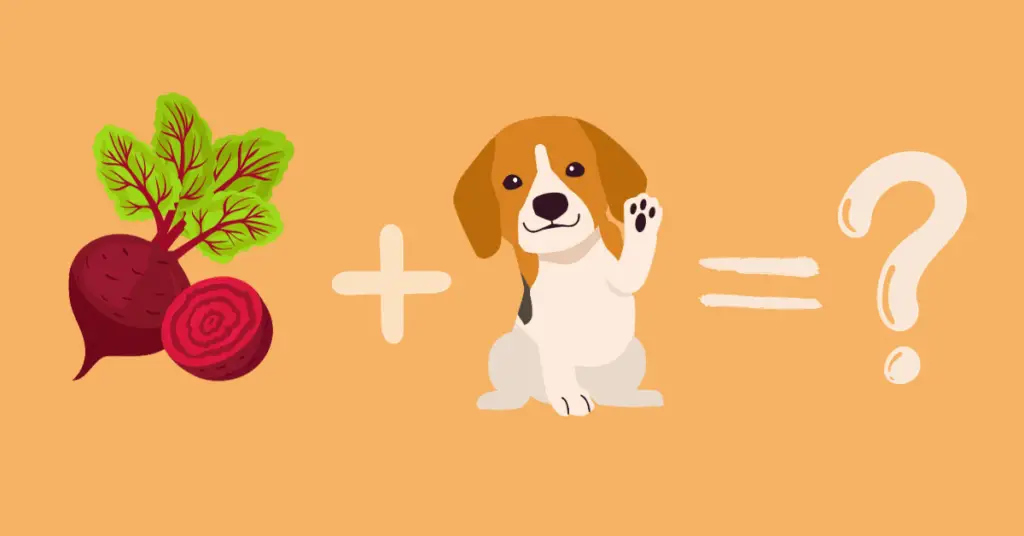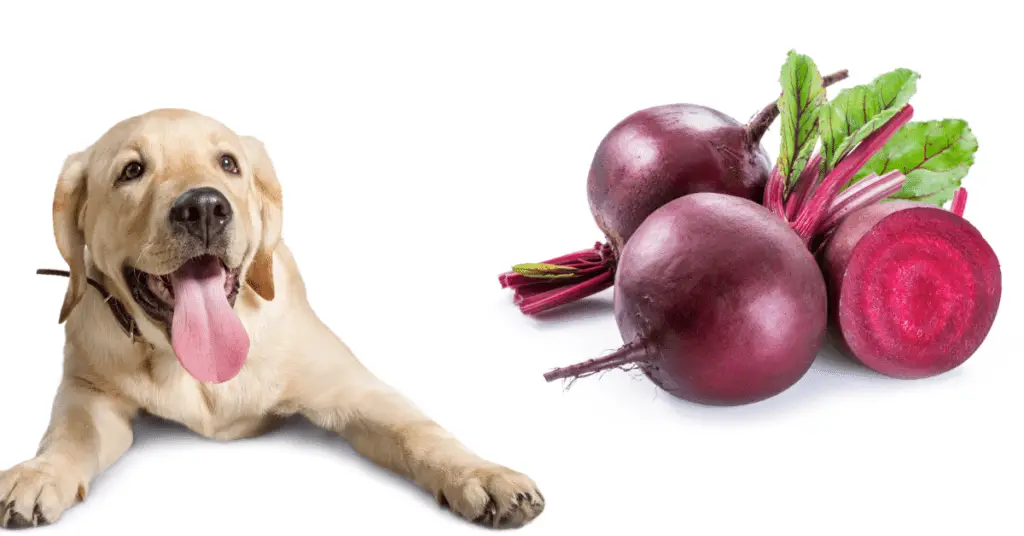
When it comes to keeping our furry friends in the pink of health, we often explore various dietary options to ensure they receive the best nutrition. One such option that has garnered quite a bit of attention is beets. Are beets good for dogs? In this comprehensive guide, we’ll delve into the world of canine nutrition, exploring the potential benefits and considerations when introducing beets to your dog’s diet.
Can dogs eat Beets?
Absolutely, dogs can enjoy beets in their diet, and “Are Beets Good for Dogs?” is a question worth exploring. Beets offer a range of potential health benefits for our canine companions. They are a rich source of essential vitamins and minerals, including vitamin C, which supports their immune system, and vitamin B6, which is crucial for metabolism and overall health. Beets also provide dietary fiber, aiding in healthy digestion and preventing issues like constipation.
Exploring the Nutritional Powerhouse: Beets
Beets, known for their vibrant red hue, are not only appealing to the human eye but also pack a powerful nutritional punch. They are a rich source of essential vitamins and minerals, including vitamin C, vitamin B6, folate, iron, and potassium. Beets are also low in calories, making them a healthy option for both humans and, as we will discover, our canine companions.
- Vitamins:
- Vitamin C: Beets are a good source of vitamin C, which supports the immune system and overall health.
- Vitamin B6: This vitamin is essential for metabolism and helps maintain healthy skin and nerves.
- Folate (Vitamin B9): Folate is crucial for cell division and is especially important during pregnancy.
- Minerals:
- Iron: Beets contain iron, which is necessary for the production of hemoglobin and oxygen transport in the body.
- Potassium: It’s like the superhero of minerals, swooping in to keep your blood pressure in check and make sure your muscles and nerves play nice.
- Dietary Fiber:
- Beets are rich in dietary fiber, promoting healthy digestion and regular bowel movements.
- Antioxidants:
- Beets contain antioxidants like betalains and carotenoids, which help protect cells from oxidative damage.
- Low in Calories:
- Beets are relatively low in calories, making them a healthy addition to your diet without contributing to excessive calorie intake.
- Natural Sugars:
- Beets have natural sugars, primarily in the form of sucrose, which provide a mild sweetness.
- Nitrates:
- Beets are a natural source of nitrates, which can have potential benefits for cardiovascular health.
- Phytonutrients:
- Beets contain phytonutrients like betaine, which may support liver health and reduce inflammation.
- Iron and Folate Combo:
- The combination of iron and folate in beets can be beneficial for those with anemia or during pregnancy.
- Low in Fat:
- Beets are virtually fat-free, making them a healthy choice for those watching their fat intake.
Health Benefits of Beets for Dogs
While beets are not a typical part of a dog’s diet, there are several potential health benefits to consider:
1. Improved Digestive Health: Beets are high in dietary fiber, which can aid in promoting healthy digestion for your dog. Fiber can prevent constipation and regulate bowel movements.
2. Rich in Antioxidants: Beets contain antioxidants that can help protect your dog’s cells from damage caused by free radicals. This may contribute to overall well-being and a healthier immune system.
3. Nutrient-Rich: The vitamins and minerals in beets can support your dog’s overall health, helping maintain strong bones, a robust immune system, and a shiny coat.
Can Dogs Eat Beets Raw?
Feeding your dog raw beets is not recommended. While beets can offer nutritional benefits when cooked, raw beets can be difficult for dogs to digest. They might lead to digestive discomfort, including upset stomach and diarrhea. Additionally, raw beets can present a choking hazard due to their firm texture. It’s safer and healthier to cook beets before offering them to your furry friend.
Can Dogs Eat Pickled Beets?
It’s best to avoid feeding your dog pickled beets. Pickled beets are typically soaked in vinegar and often contain added spices and seasonings. These additives can be harmful to your dog’s digestive system and overall health. The high sodium content in pickled beets is also a concern, as excessive salt intake can lead to sodium toxicity in dogs. To ensure your dog’s safety, it’s better to stick with plain, cooked beets without any added flavors or preservatives.
Can Dogs Eat Canned Beets?
Canned beets are generally not a suitable option for dogs. While they are already cooked, canned beets can contain high levels of sodium and preservatives, which are not healthy for your canine companion. The excess sodium in canned beets can lead to health issues, particularly if your dog consumes them regularly. To provide your dog with the nutritional benefits of beets, it’s safer to opt for freshly cooked or steamed beets without any added seasonings or preservatives.
Can Dogs Drink Beet Juice?
Offering your dog small amounts of beet juice is generally considered safe, but it should be done with caution. Beet juice is rich in natural sugars, so moderation is key. Too much beet juice can lead to an upset stomach and diarrhea in dogs. It’s best to dilute the juice with water to reduce its sugar concentration.
Feeding Beets to Your Dog: A Step-By-Step Guide

Before introducing beets into your dog’s diet, it’s essential to exercise caution and follow these guidelines:
1. Consult Your Veterinarian: Always seek the advice of your veterinarian before making significant changes to your dog’s diet. They can provide tailored recommendations based on your dog’s specific needs.
2. Start Slowly: If your vet approves, begin by introducing small amounts of beets into your dog’s diet. Monitor their reaction and digestive system for any adverse effects.
3. Proper Preparation: Beets should be cooked before feeding them to your dog. Raw beets can be challenging to digest and might not be as beneficial.
4. Watch for Allergies: Keep a close eye on your dog for any signs of allergies or sensitivities to beets. While rare, some dogs may experience adverse reactions.
How Many Beets Can Dogs Eat?
The number of beets a dog can safely eat depends on their size, as well as their individual tolerance to this root vegetable. Here’s a general guideline for different dog sizes:
Small Breeds (e.g., Chihuahua, Pomeranian)
Small dog breeds, like Chihuahuas and Pomeranians, should be given very small portions of beets. A safe starting point is about 1 to 2 teaspoons of cooked and finely chopped beets. Monitor your dog’s reaction and digestive system for any adverse effects before increasing the portion.
Medium-Sized Breeds (e.g., Beagle, Bulldog)
For medium-sized breeds such as Beagles and Bulldogs, you can offer slightly larger portions of beets. Begin with approximately 1 to 2 tablespoons of cooked beets. As with smaller dogs, keep a close eye on their response and adjust the serving size as needed.
Large Breeds (e.g., Labrador Retriever, German Shepherd)
Larger breeds like Labrador Retrievers and German Shepherds can tolerate a bit more beet in their diet. Start with 2 to 4 tablespoons of cooked beets. Again, observe your dog’s digestion and overall well-being to determine if this quantity suits them.
NOTE: It’s important to note that these are general guidelines, and individual dogs may have varying sensitivities and preferences. Always consult your veterinarian before introducing beets or any new food into your dog’s diet, especially if your dog has specific dietary restrictions or health concerns.
Potential Concerns and Considerations
Sugar Content: Beets contain natural sugars, so it’s crucial to monitor your dog’s sugar intake. An overabundance of sugar can contribute to both unwanted weight gain and dental problems.
Urinary Color: Don’t be alarmed if you notice a change in your dog’s urine color after consuming beets. This is entirely normal and harmless.
Portion Control: Beets should be a small part of your dog’s diet, not a primary source of nutrition. Balance is key to a healthy diet.
Other vegetables safe for dogs
Dogs can enjoy a variety of vegetables as part of their diet, providing both nutrition and taste. Here are some other vegetables that are generally safe for dogs:
- Carrots: Carrots are a popular choice. They are low in calories and high in vitamins and fiber, making them a great, crunchy treat that promotes dental health.
- Sweet Potatoes: These are an excellent source of dietary fiber, vitamins, and minerals. They can be served cooked, mashed, or as sweet potato fries.
- Broccoli: Broccoli is rich in vitamins, including vitamin C, and contains fiber. It’s best to serve it in small, cooked portions.
- Green Beans: Green beans are low in calories and packed with vitamins and minerals. They make a nutritious addition to your dog’s meal.
- Peas: Peas are another good source of vitamins and fiber. They are often found in commercial dog food due to their nutritional value.
- Zucchini: Zucchini is low in calories and can be sliced or grated into your dog’s food to add extra nutrients.
- Cucumbers: Cucumbers are hydrating and low in calories. They’re a cool and nutritious doggy treat.
- Daikon: Daikon is generally safe for dogs to consume. It’s low in calories and can be a healthy addition to their diet.
- Cabbage: Cabbage is safe for dogs in small amounts and offers vitamins and antioxidants.
Remember that while these vegetables can be beneficial for your dog, it’s crucial to prepare them in a way that is easy for your dog to digest, and to serve them in moderation.
In Conclusion
So, are beets good for dogs? When incorporated thoughtfully into your dog’s diet and under the guidance of a veterinarian, beets can provide valuable health benefits. However, like any dietary addition, moderation is key. Keep in mind, every dog is different, and what’s good for one may not suit another. Keep a close eye on your pet’s well-being and adjust their diet as needed.
As a responsible pet owner, you are now armed with the knowledge to make informed decisions about your dog’s nutrition. Beets can be a wholesome addition to their diet, contributing to their overall health and vitality.

Very interesting details you have noted, thanks for putting up.Raise
your business
Thank you for your sharing. I am worried that I lack creative ideas. It is your article that makes me full of hope. Thank you. But, I have a question, can you help me?